英语总复习课件
合集下载
中考英语六种时态(总复习)课件
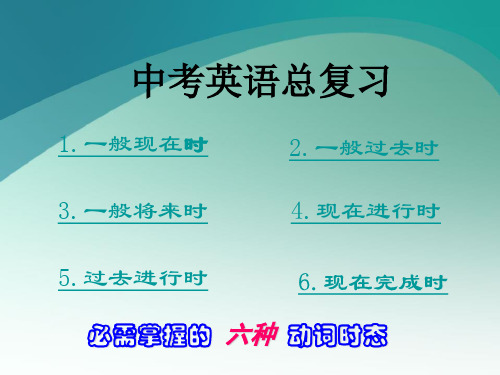
时 态
完成时:谓语用have/has +动词的过
去分词
过去 进行时:谓语用were/was +动词
的现在分词
More practice(中考链接):
• 用动词的适当形式完成句子。
• 1. Light __________ (travel) more quickly than sound does.(现在时)
练习
( A ) 1. Look at the clouds. ___.
A. It's going to rain
B. It'll be raining
C. It will be rained
D. If it rains
( D ) 2.There___ two English films next week.
A. watch B. will watch C. are watching D. watches
( C ) 3、The sun ___ in the east and___ in the west.
A. raises; set B. rise; sets C. rises; sets D. rises; set
Who is flying a kite there? 注意:go,come,leave,arrive,return,die等的进 行时可表示即将要发生的动作.
练习
( B ) 1 、______ you ___ your homework now?
A. Do; doing
B. Are; doing
C. Are; finished
D. Do; finish
( A ) 2 He ___ in our school for 20 years and he ___ here in 1977.
中考英语总复习课件:完形填空(共15张PPT)
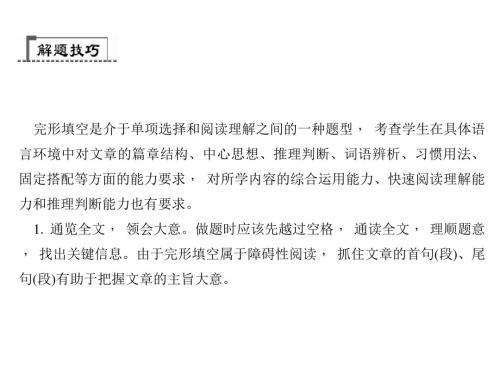
1. A. said B. told C. talked D. spoke
2. A. us B. me C. her D. them
3. A. learning B. learns C. will learn D. to learn 4. A. friends B. children C. members D. enemies
完形填空是介于单项选择和阅读理解之间的一种题型, 考查学生在具体语 言环境中对文章的篇章结构、中心思想、推理判断、词语辨析、习惯用法、 固定搭配等方面的能力要求, 对所学内容的综合运用能力、快速阅读理解能 力和推理判断能力也有要求。 1. 通览全文, 领会大意。做题时应该先越过空格, 通读全文, 理顺题意 , 找出关键信息。由于完形填空属于障碍性阅读, 抓住文章的首句(段)、尾 句(段)有助于把握文章的主旨大意。
it with others.” It's true. Friends make __2__ enjoy the taste of our success and
joys(快乐) and comfort us in our challenging moments. They provide a mirror(镜 子) for us __3__ more about ourselves. I've always looked at friends as family
文是否流畅、逻辑关系是否合理。复查时, 从语法入手, 检查句子的时态、 主谓一致、代词的数、格及词语的搭配等是否合理。
As the saying goes, “Friends are treasure in our lives.” I remember when I was growing up, my mom always __1__, “Half the fun of doing anything is sharing
人教版九年级英语全一册总复习PPT课件

九年级英语总复习
-
1
unit1 u Exercise2 Exercise3 Exercise1 Exercise2 Exercise3 Exercise1 Exercise1 Exercise1
unit2 unit4 unit6
-
Exercise1 Exercise2 Exercise3 Exercise1 Exercise1 Exercise1 Exercise1 Exercise1 Exercise1
C. generous
D. shy
( ) 2. —Do you know who C America, Andy?
2
unit7
unit9 unit11
九年级英语总复习目录
Exercise1
Exercise2
unit8
Exercise3
unit1-7词汇复习1
unit1-7词汇复习2
unit1-7语法练习
unit1-7交际用语练习
Exercise1
Exercise2
unit10
Exercise3
Exercise1
17. 一点一点地
18. 代替;而不是
19. 为……做准备
20. 一次又一次
11. have… in common 12. pay attention to 13. connect… with… 14.
explain sth to sb
15. find out 16. on one’s own 17. bit by bit 18. instead of
19. prepare for… 20. over and over again
-
7
【学以致用】 根据句意及汉语提示,填写适当的短
-
1
unit1 u Exercise2 Exercise3 Exercise1 Exercise2 Exercise3 Exercise1 Exercise1 Exercise1
unit2 unit4 unit6
-
Exercise1 Exercise2 Exercise3 Exercise1 Exercise1 Exercise1 Exercise1 Exercise1 Exercise1
C. generous
D. shy
( ) 2. —Do you know who C America, Andy?
2
unit7
unit9 unit11
九年级英语总复习目录
Exercise1
Exercise2
unit8
Exercise3
unit1-7词汇复习1
unit1-7词汇复习2
unit1-7语法练习
unit1-7交际用语练习
Exercise1
Exercise2
unit10
Exercise3
Exercise1
17. 一点一点地
18. 代替;而不是
19. 为……做准备
20. 一次又一次
11. have… in common 12. pay attention to 13. connect… with… 14.
explain sth to sb
15. find out 16. on one’s own 17. bit by bit 18. instead of
19. prepare for… 20. over and over again
-
7
【学以致用】 根据句意及汉语提示,填写适当的短
人教版(PEP)六年级英语上册期末总复习课件

-----I’m going to be a science teacher one day. 我想将来有一天 当科学老师
1、What are you going to do?你想做什么?询问他人在未来的 打算。be going to 后面要跟动词的原形。注意be going to be 意思是 “打算成为什么,干什么职业。” 注意一下句子的区别,找出正确回答。 What are you going to do this afternoon? I am going to 加 做事的词组
pep六年级英语期末复习
重点词汇 science museum post office bookstore cinema hospital crossing turn left go straight turn right 重点句型 Where is the museum shop?
It’s near the door.
3 We’re going to draw some pictures in Renmin Park. 我们要到人民公园去画画。 4、 I’m going to see a film. 我打算去看电影。
5、 I’m going to visit my grandparents. 我打算去看望外 祖父母。
How are you going?I am going to 加交通方式的词组
Who are you going with? I am going to 加某人
部分疑问代词的意义与用法:
(1)What 什么。用来问是什么,做什么,叫什么,什么样等 等。如:What is your name? 你的名字叫什么? What is your father? 你爸爸是干什么的? What is your hobby?你的爱好是什么?What is your favourite food?你最喜爱的食物是什么? What’s your math teacher like? 你的数学老师长得什么样子? (2)Where , 在哪里,到哪里。用来问地点。
1、What are you going to do?你想做什么?询问他人在未来的 打算。be going to 后面要跟动词的原形。注意be going to be 意思是 “打算成为什么,干什么职业。” 注意一下句子的区别,找出正确回答。 What are you going to do this afternoon? I am going to 加 做事的词组
pep六年级英语期末复习
重点词汇 science museum post office bookstore cinema hospital crossing turn left go straight turn right 重点句型 Where is the museum shop?
It’s near the door.
3 We’re going to draw some pictures in Renmin Park. 我们要到人民公园去画画。 4、 I’m going to see a film. 我打算去看电影。
5、 I’m going to visit my grandparents. 我打算去看望外 祖父母。
How are you going?I am going to 加交通方式的词组
Who are you going with? I am going to 加某人
部分疑问代词的意义与用法:
(1)What 什么。用来问是什么,做什么,叫什么,什么样等 等。如:What is your name? 你的名字叫什么? What is your father? 你爸爸是干什么的? What is your hobby?你的爱好是什么?What is your favourite food?你最喜爱的食物是什么? What’s your math teacher like? 你的数学老师长得什么样子? (2)Where , 在哪里,到哪里。用来问地点。
小升初英语总复习 英语48个音标课件 34张幻灯片

eg: zest(热情),zero(零),zoo(动物园)
/θ/ /ð/
英语48个音标课件
/θ/ 舌尖微微伸出,上下齿轻轻咬住舌尖送气,但声带不振动。 eg:bath(洗澡),thought(思考),thank(谢谢)
/ð/ 口形与/θ/ 相似,舌尖微微伸出,上下齿轻轻咬住舌尖送气,但声带
需振动。
英语48个音标课件
双元音的学习
英语48个音标课件
/eɪ/ /əʊ/ /aɪ/
/eɪ/ 由/e/ 和/ɪ/ 两个单音组成, /e/ 重读, /ɪ/ 轻读,口形
由半开到合,与字母A发音相同。 eg: same(相同的),late(迟到的),cake(蛋糕) /əʊ/ 由/ə/和/ʊ/ 两个单音组成, /əʊ/的发音也是一个过程,
/ɔ/ 短元音,口腔打开,嘴张大,舌向后缩,双
唇稍收圆。 eg:fond(喜欢的),lock(锁),hot(热的)
/ɑ:/ / ʌ /
英语48个音标课件
/ɑ:/
长元音,口腔打开,嘴张大,舌身放平,舌尖不抵下齿,下 巴放低,轻松发音。
eg: car(小汽车),art(艺术),bath(洗澡)
/ʌ / 短元音,嘴唇微微张开伸向两边,舌尖轻触下齿,唇后部稍
自然放松发声。 eg: forget(忘记),dollar(美元),power(势力)
/u:/ /ʊ/
英语48个音标课件
/u:/ 长元音,嘴形小而圆,微微外凸,舌头尽量后缩。 eg: move(移动),spoon(汤勺),room(房间) /ʊ/ 短元音,嘴唇张开略向前突出,嘴形稍收圆并放松些。 eg: good(好的),could(能够),should(应该)
英语48个音标课件
Why 为什么要学习音标?
高三总复习英语课件 重难语法 非谓语动词

第二组(写作)
1.(2021·全国甲卷) In order to forest students' richer insight into Chinese culture , a class meeting themed introducing Chinese traditional culture to foreign friends will be launched in our school. 为了让学生更深入地了解中国文化,我们学校将推出一个向外国朋友介绍中国 传统文化为主题的课堂会议。
2.(2021·浙江卷)In 1985, urban men and women in more than three quarters of the countries studied (study) had higher BMIs than men and women in rural areas.
2.(2021·全国乙卷)On the one hand, providing an easy access to plenty of excellent learning sources , online learning is really a helping hand.
一方面,提供方便访问大量的优秀学习来源,在线学习确实是一个好帮手。
重难语法 非谓语动词
第一组(语法填空)
1.(2021·浙江卷)This may be due to some disadvantages for people living (live) in the countryside, including lower levels of income and education, higher costs of healthy foods, and fewer sports facilities.
人教版七年级英语上册期末总复习课件PPT

这里输入您的文本 这里输入您的文本
您的文本 您的文本
这里输入您的文本 这里输入您的文本
这里输入您的文本
这里输入您的文本
点击这里输入您的标题
输入您的文本
输入您的文本
输入您的文本
这里输入您的文本这里
这里输入您的文本这里输
这里输入您的文本这里
输入您的文本这里输入
入您的文本这里输入您的
输入您的文本这里输入
单击这里输入内容,单击这里输入内容
单击这里输入内容,单击这里输入内容
点击这里输入您的标题
您的文本内容
您的文本内容
您的文本内容 您的文本内容
点击这里输入您的标题
您的 文本
您的 文本
您的 文本
您的 文本
这里输入你的文本内容这 里输入你的文本
这里输入你的文本内容这 里输入你的文本
这里输入你的文本内容这里 输入你的文本
您
的
• 在此添加标题或目录索引
文 您
• 在此添加标题或目录索引
本
的
• 在此添加标题或目录索引
文
• 在此添加标题或目录索引
本
您
• 在此添加标题或目录索引
的
• 在此添加标题或目录索引
文
本
点击这里输入您的标题
单击添加标题
点击添加文本
单击此处输入标题文字
填加文字
填加 标题
填加文字
单击添加标题 点击添加文本
章节
5 这里输入您的标题五
点击这里输入您的标题
01 02 03 04
某某方面: 这里输入你的文本内容这里输入你的文本内容这里输 入 某你某的方文面本:内容这里输入你的文本内容你的文本内容 这里输入你的文本内容这里输入你的文本内容这里输 入 某你某的方文面本:内容这里输入你的文本内容你的文本内容 这里输入你的文本内容这里输入你的文本内容这里输 入 某你 某方的面文:本内容这里输入你的文本内容你的文本内容 这里输入你的文本内容这里输入你的文本内容这里输 入你的文本内容这里输入你的文本内容你的文本内容
新人教版八年级英语上册期末总复习课件
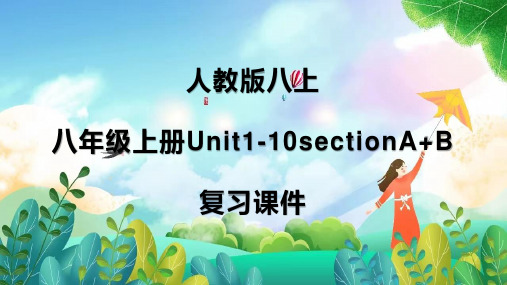
单词复习
famous著名的 well-known著名的 nature自然地 agree同意 normal一般的 unless除非不 certainly无疑的 serve服务 look after 照顾 invitation邀请
again再一次 angry发怒的 understanding善解人意的 careless粗心的 often多久 as far关于,至于 natural自然地 turn down拒绝 reply回复 forward发送
until直到 how often多久 how long 多长时间 how soon多久才... lendar日历 daytime白天 in half分成两半 halfway在中途 else别的,其他的
单词复习
how munch多少钱 how far多远 be good for对....好 be good at擅长...... be bad for 对.......有坏处 be good with 与....相处的好 wrong怎么了? halfway在中途 else别的,其他的
今日复习的重点
本单元的所有单词、短语、语法、长难句、课文
grow成长 meeting遇见 pollute污染 prepare准备 prepare for准备 two两个 twice两次 one一个 once一次 health健康 healthy健康的
单词复习
upset沮丧的 different不同的 unhealthy不健康的 difference差异 foot脚 feet脚步 advice建议,劝告 another其他的 happen发生 expect 期待
单词复习
mistake错误 week一周 a lot of 大量 be good for 对什么好 stress压力 get back返回 careful小心的 careless粗心的 advice建议 solve步骤 during在........期间
七年级英语上册总复习公开课PPT课件

I like ice-cream, but I don’t eat it because I don’t want to be fat.
So I’m healthy.
第9页/共38页
Fruit: apple, banana, orange, pear, strawberry Vegetables: carrot, tomato, potato, Food: cake, egg, hamburger, rice, salad, chicken Dessert(甜食): ice-cream
√-Sure. (2013-2014)
A. oranges B. bread C. carrots
√
4. Please take these _____ to your aunt: her hat, watch and bag.
第18页/共38页
5. – I plan to go out for a trip, but I’m afraid I don’t know the ______. (2008年中考)
第23页/共38页
(6)考查“动词词组的区别运用”的试题
16. -Paul’s birthday is next week . Let’s ___ the presents ( 礼物). -OK. How about a basketball? He likes sports.
A. play with B. come on C. think about
•总思路:以话题为中心,以功能为主线,兼 顾语言结构逐步引导学生运用英语完成交际 任务。
即:话题—功能—结构—任务。
第1页/共38页
话题 结构
功能 考点
高考英语语法总复习之名词性从句课件

A. What
B. That
C. It
D. As
05. ______ is going to do the job will be decided in tomorrow’s meeting.
A. Which
B. That
C. What
D. Who
宾语从句
陈述
• that He believes that the earth is flat. ➢ that一般可以省略,但在如下情况则不能省
同位语从句
陈述
• that
The news that he has fallen in love has spread across the school.
疑问
• whether
I have no idea whether he’ll come or not.
• wh-/how(-ever)
It is a question how he will get a good score without memorizing words.
that
无意义,不作从句主干成分,在宾从中可省
I hear (that) he has joined the football club.
有意义,不作从句主干成分,不省略
I didn’t know whether/if he would attend the concert.
whether和if
两者区别
1) 并列几个宾语时,从第二个起不省 He believes (that) the earth is flat and that the sun turns around the earth. 2) 有插入语等其它成分干扰 He said, I remember, that he would help you, but…
人教版七年级英语下册 Unit4总复习课件

can 能,会 (表示能力) —Can you play basketball? —Yes, I can. 你会打篮球吗? 是的, 我会。
have to 必须,不得不 don’t / doesn’t have to 不必
你不必在上午七点前到校。 You don’t have to be school before 7:00.
考点7
祈使句
1.祈使句是表示命令、叮嘱、号召等的句子; 2.通常省略主语you; 3.句中谓语动词用动词原形; 4.祈使句有肯定和否定两种:
否定
Don’t eat in class. Don’t play sports in the classroom. Don’t fight.
肯定
Come in, please! 请进! Sit down, please. 请坐。
违规 break rules
3.考点归纳
考点1
arrive in / at与get to 的区别
① My father arrived in / got to Beijing this morning.
我爸爸今天上午到达了北京。
② The farmer arrived at / got to an old house and knocked at
(be) on time be late for … in class listen to … dining hall eat outside bring … to … have to wear the school uniform go out see friends practice the guitar
26.遵循;跟随v.
follow
27.幸运;运气n.
have to 必须,不得不 don’t / doesn’t have to 不必
你不必在上午七点前到校。 You don’t have to be school before 7:00.
考点7
祈使句
1.祈使句是表示命令、叮嘱、号召等的句子; 2.通常省略主语you; 3.句中谓语动词用动词原形; 4.祈使句有肯定和否定两种:
否定
Don’t eat in class. Don’t play sports in the classroom. Don’t fight.
肯定
Come in, please! 请进! Sit down, please. 请坐。
违规 break rules
3.考点归纳
考点1
arrive in / at与get to 的区别
① My father arrived in / got to Beijing this morning.
我爸爸今天上午到达了北京。
② The farmer arrived at / got to an old house and knocked at
(be) on time be late for … in class listen to … dining hall eat outside bring … to … have to wear the school uniform go out see friends practice the guitar
26.遵循;跟随v.
follow
27.幸运;运气n.
小学英语总复习 ppt课件
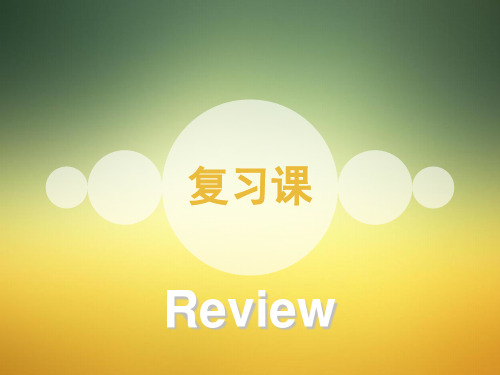
替。如: This (suit) is expensive, isn't it? 这套衣服昂贵,不是吗? "Are those yours?" "Yes, they are." “那些是你的吗?”“是的,
它们是我的。
常见的疑问代词有who(谁)when(什么时候),where (哪里),what(什么),how(怎样) ,which(哪一个) 等等。
名词
写出下列各词的复数 I ___w_e ___ him ___th_e_y __ this __t_ha_t ___ her __t_he_y__ watch _w_a_tc_h_e_s _child _c_h_ild_re_n_that ___th_os_e__ phos___ sandwich_s_a_nd_w_ic_he_s_ boy___bo_y_s __dress__d_re_ss_e_s _tooth___te_et_h__sheep_s_h_e_ep__ box__b_ox_e_s__man__m_en___woman__w_om_e_n__ toy__to_ys____ family__fa_m_il_ie_s _
一、人称代词和物主代词
1、人称代词有主格和宾格的区别:主格通常位于句中第 一个动词之前,宾格一般位于动词或介词之后。
2、物主代词有形容词性与名词性的区别:形容词性用时 后面一般要带上词,名词性则单独使用,后面不带名词。
3、指示代词 共有四个:this,that,these,those。this 和 that 用于指代单数,these和 those用于指代复数。
4、疑问代词 一般用来构成特殊疑问句,常见的疑问代词 有who(谁),when什么时候),where(哪里),what(什 么),how(怎样) ,which(哪一个)等等。
它们是我的。
常见的疑问代词有who(谁)when(什么时候),where (哪里),what(什么),how(怎样) ,which(哪一个) 等等。
名词
写出下列各词的复数 I ___w_e ___ him ___th_e_y __ this __t_ha_t ___ her __t_he_y__ watch _w_a_tc_h_e_s _child _c_h_ild_re_n_that ___th_os_e__ phos___ sandwich_s_a_nd_w_ic_he_s_ boy___bo_y_s __dress__d_re_ss_e_s _tooth___te_et_h__sheep_s_h_e_ep__ box__b_ox_e_s__man__m_en___woman__w_om_e_n__ toy__to_ys____ family__fa_m_il_ie_s _
一、人称代词和物主代词
1、人称代词有主格和宾格的区别:主格通常位于句中第 一个动词之前,宾格一般位于动词或介词之后。
2、物主代词有形容词性与名词性的区别:形容词性用时 后面一般要带上词,名词性则单独使用,后面不带名词。
3、指示代词 共有四个:this,that,these,those。this 和 that 用于指代单数,these和 those用于指代复数。
4、疑问代词 一般用来构成特殊疑问句,常见的疑问代词 有who(谁),when什么时候),where(哪里),what(什 么),how(怎样) ,which(哪一个)等等。
人教版英语八年级上册Unit 1 总复习课件PPT(共18页)

Is everybody here? 大家都到齐了吗? 4)something,somebody,someone,somewhere用于肯定句及表 示请求或建议的疑问句中,而anything,anybody,anyone, anywhere用于否定句、疑问句及条件状语从句中。如: Did you do anything interesting? 你做了有趣的事吗?(表疑 问) Why don’t you visit someone with me? 你为什么不跟我一起 去拜访下某个人呢?(表建议)
Did you buy anything special?你买了什么特别的东西吗? Yes, I bought something for my father.对,我给父亲买了一 些东西。
How was the food? 食物怎么样? Everything tasted really good.每一样东西真的都好吃。
人教版英语八年级上册Unit 1 总复习课件(共18张PPT)
人教版英语八年级上册Unit 1 总复习课件(共18张PPT)
三、习惯用法、搭配 11. stop doing sth. 停止做某事 12. look + adj 看起来 13. dislike doing sth. 不喜欢做某事 14. Why not do sth. 为什么不做…….呢? 15. so + adj + that + 从句 如此……以至于…… 16. tell sb. (not) to do sth. 告诉某人(不要) 做某事 17. keep doing sth. 继续做某事/一直做某事 18. forget to do sth. 忘记去做某事 / forget doing sth 忘记做 过某事
Did you buy anything special?你买了什么特别的东西吗? Yes, I bought something for my father.对,我给父亲买了一 些东西。
How was the food? 食物怎么样? Everything tasted really good.每一样东西真的都好吃。
人教版英语八年级上册Unit 1 总复习课件(共18张PPT)
人教版英语八年级上册Unit 1 总复习课件(共18张PPT)
三、习惯用法、搭配 11. stop doing sth. 停止做某事 12. look + adj 看起来 13. dislike doing sth. 不喜欢做某事 14. Why not do sth. 为什么不做…….呢? 15. so + adj + that + 从句 如此……以至于…… 16. tell sb. (not) to do sth. 告诉某人(不要) 做某事 17. keep doing sth. 继续做某事/一直做某事 18. forget to do sth. 忘记去做某事 / forget doing sth 忘记做 过某事
高三英语总复习必修1Unit3课件共55张.ppt

单元知识检测
考点突破
实战演练
高考总复习(广东专版)
必修一 Unit3
完成句子 (1)她更喜欢不看演讲稿演讲。 She prefers speaking without referring to her notes. (2)我更喜欢乡村生活而不喜欢城市生活。 I prefer country life to town life. (3)他们宁愿死也不愿向敌人屈服 They preferred to die rather than give in to the enemy. (4)她喜欢穿正式的服装而不喜欢穿运动装。 She prefers dressing formally to wearing sport clothes.
persuade sb.not to do sth.=persuade sb.out of doing sth.说服某人不做某事
persuade sb.of sth.=persuade sb.that...使某人相信某 事
try to persuade sb.to do sth.=advise sb.to do sth.尽力 劝说某人做某事(但未劝服)
使某人对某事感兴趣
4.insist on doing sth.
坚持做某事
单元知识检测
考点突破
实战演练
高考总复习(广东专版)
必修一 Unit3
5.care about
关心;惦念
6.make up one’s mind 下决心
7.give in
屈服;让步;投降
8. put up tent
搭起帐篷
9.be determined to do sth. SS 决定做某事
[答案] 1. taking 2. It 3. rode 4. whose 5. When/As 6. Despite 7. determined 8. an 9. continuous 10. where
2024版高考英语一轮总复习必修第三册Unit1FestivalsAndCelebrations课件
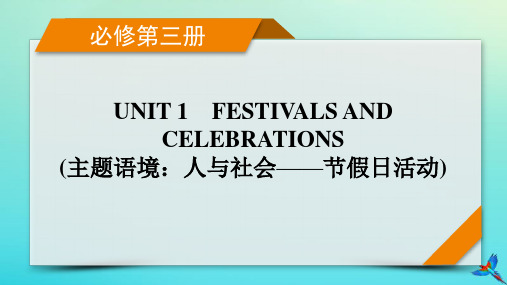
11.(2020·浙江高考)By about 6,000 BC,people discovered the best __c_r_o_p_s__(庄稼) to grow and animals to raise.
12.(2020·全国卷I)There is an _a_t_m_o_s_p_h_e_r_e___(气氛) of excitement in the air.
Hale Waihona Puke 10.___r_e_f_le_c_t__ vt.显示;反映;反射→ ___r_e_fl_e_c_ti_o_n___ n.倒影;反 映;思考
11.___b_e_l_ie_f__ n. 信 仰 ; 信 心 ; 信 任 → __b_e_l_ie_v_e___ vt. 相 信 → ___b_e_l_ie_v_a_b_l_e__ adj.可以相信的→ ___u_n_b_e_li_e_v_ab_l_e___
6.(2022·新高考Ⅰ卷)The arugula(芝麻菜) was to make a nice green salad, rounding out a __r_o_a_s_t __(烤的) chicken dinner.
7.(2022·全国甲卷)He poured water from a bottle into his hand and offered it to my dogs.In that __m_o_m__en_t__(瞬间), I began to fall for him.
18.___g_ra_c_e__ n.优美;优雅;高雅→ ___g_r_a_ce_f_u_l__ adj.优美的;高雅 的
19.___re_s_p_e_c_t__ n.& vt.尊敬;尊重→ ____re_s_p_e_c_tf_u_l__ adj.恭敬的;表 示敬意的→ ___re_s_p_e_c_ta_b_l_e___ adj.可敬的;体面的
12.(2020·全国卷I)There is an _a_t_m_o_s_p_h_e_r_e___(气氛) of excitement in the air.
Hale Waihona Puke 10.___r_e_f_le_c_t__ vt.显示;反映;反射→ ___r_e_fl_e_c_ti_o_n___ n.倒影;反 映;思考
11.___b_e_l_ie_f__ n. 信 仰 ; 信 心 ; 信 任 → __b_e_l_ie_v_e___ vt. 相 信 → ___b_e_l_ie_v_a_b_l_e__ adj.可以相信的→ ___u_n_b_e_li_e_v_ab_l_e___
6.(2022·新高考Ⅰ卷)The arugula(芝麻菜) was to make a nice green salad, rounding out a __r_o_a_s_t __(烤的) chicken dinner.
7.(2022·全国甲卷)He poured water from a bottle into his hand and offered it to my dogs.In that __m_o_m__en_t__(瞬间), I began to fall for him.
18.___g_ra_c_e__ n.优美;优雅;高雅→ ___g_r_a_ce_f_u_l__ adj.优美的;高雅 的
19.___re_s_p_e_c_t__ n.& vt.尊敬;尊重→ ____re_s_p_e_c_tf_u_l__ adj.恭敬的;表 示敬意的→ ___re_s_p_e_c_ta_b_l_e___ adj.可敬的;体面的
高考英语总复习专题课件:冠词(共30张PPT)

We’re going to watch a match on Sunday. (5) 表示职务、头衔的名词作表语、同位语、补足语等
时,其前不用冠词。如:
Sam has been appointed manager of the engineering department to take place of George. (6) 在某些固定搭配中, 如:at dawn, on second thoughts, come to light, come to power, give birth to, out of control, in public, ahead of time, in debt, hand in hand, in place of, do harm to等。
—It’s said John will be in a job paying over $60,000 a year.
—Right, he will also get paid by the week.
口诀记忆the的用法 特指熟悉与复述,独一无二全用the。 方位乐器名词前,序数形最乐位惯。 复数姓氏与专有,习惯用语最后添。
(3) 在单数名词前,表示某一类别或某项发 明。如:The tiger is a dangerous animal.
(4) 在由普通名词构成的专有名词前及表示江、 河、湖、海、山川、群岛等的名词前。如:
We are said to be living in the Information Age, a time of new discoveries and great changes.
(7) 用在季节、月份、星期或节日的名词前,表 示某个特定的季节、月份、日子或节日。如: The accident happened on a rainy Sunday towards the end of July.
时,其前不用冠词。如:
Sam has been appointed manager of the engineering department to take place of George. (6) 在某些固定搭配中, 如:at dawn, on second thoughts, come to light, come to power, give birth to, out of control, in public, ahead of time, in debt, hand in hand, in place of, do harm to等。
—It’s said John will be in a job paying over $60,000 a year.
—Right, he will also get paid by the week.
口诀记忆the的用法 特指熟悉与复述,独一无二全用the。 方位乐器名词前,序数形最乐位惯。 复数姓氏与专有,习惯用语最后添。
(3) 在单数名词前,表示某一类别或某项发 明。如:The tiger is a dangerous animal.
(4) 在由普通名词构成的专有名词前及表示江、 河、湖、海、山川、群岛等的名词前。如:
We are said to be living in the Information Age, a time of new discoveries and great changes.
(7) 用在季节、月份、星期或节日的名词前,表 示某个特定的季节、月份、日子或节日。如: The accident happened on a rainy Sunday towards the end of July.
高三总复习英语课件 Looking good, feeling good

9.memory n.记忆力,记性;记忆,回忆→_m__e_m_o_r_i_z_e v.记住,记录,记下→_m__e_m_o_r_i_a_l n.纪念碑
10.treat vt.治疗;对待→_t_r_e_a_tm__e_n_t_ n.治疗;对待,待遇;处理 11.add v.增加,添加→__a_d_d_i_ti_o_n_ n.增加,添加;加法 12.beautiful adj.美丽的→__b_e_a_u_t_y n.美,美丽;美人,美好的东西
7.surgery n. 8.guy n. 9.jeans n. 10.shadow n. 11.digital adj. 12.external adj. 13.app n.Leabharlann 外__科___手__术___
小__伙___子__,__家__伙____ 牛__仔___裤__ 阴__影___,__影__子__;__昏__暗__处__,__阴__暗__处___ 数__码___的__,__数__字__的___ 外__来___的__,__外__在__的__;__外__面__的__,__外___部__的_ 应__用___程__序__,__应__用__软__件__
6._fu__n_c_ti_o_n___ vi. n.
7._w_i_th__in__ prep.
8._r_a_th__er__ adv. 9._a_s_p_e_c_t _ n. 10._p_r_e_s_su_r_e__ n.
11._a_t_ta_c_k___ n. vt.& vi.
起作用,正常工作,运转 作用,功能,职能 在(某段时间)之内;在(某段 距离、范围)之内;在……里 相反,而是;相当;更准确地说 方面,层面 心理压力,紧张;压力; 要求,催促 发作;攻击;抨击 攻击;侵袭;抨击
10.treat vt.治疗;对待→_t_r_e_a_tm__e_n_t_ n.治疗;对待,待遇;处理 11.add v.增加,添加→__a_d_d_i_ti_o_n_ n.增加,添加;加法 12.beautiful adj.美丽的→__b_e_a_u_t_y n.美,美丽;美人,美好的东西
7.surgery n. 8.guy n. 9.jeans n. 10.shadow n. 11.digital adj. 12.external adj. 13.app n.Leabharlann 外__科___手__术___
小__伙___子__,__家__伙____ 牛__仔___裤__ 阴__影___,__影__子__;__昏__暗__处__,__阴__暗__处___ 数__码___的__,__数__字__的___ 外__来___的__,__外__在__的__;__外__面__的__,__外___部__的_ 应__用___程__序__,__应__用__软__件__
6._fu__n_c_ti_o_n___ vi. n.
7._w_i_th__in__ prep.
8._r_a_th__er__ adv. 9._a_s_p_e_c_t _ n. 10._p_r_e_s_su_r_e__ n.
11._a_t_ta_c_k___ n. vt.& vi.
起作用,正常工作,运转 作用,功能,职能 在(某段时间)之内;在(某段 距离、范围)之内;在……里 相反,而是;相当;更准确地说 方面,层面 心理压力,紧张;压力; 要求,催促 发作;攻击;抨击 攻击;侵袭;抨击
高三总复习英语课件 Sports culture

三、阅读单词——晓词义 1.solidarity n. 2.diverse adj. 3.joint adj.
n. 4.consistent adj. 5.humanity n. 6.rank vi.& vt.
n. 7.hurdle n.(hurdles)
团___结__,__齐__心__协__力__ 多___种__多__样__的__,__不__同__的__ 联___合__的__,__共__同__的__ 关___节__;__接__合__处__ 一___致__的__,__始__终__如__一__的__;__连__续___的_ (_统__称__)_人__,__人__类__;__人___性__;__人__道__,__仁__慈____ 属___于__某__等__级__,__把__…__…__分__等__级__;___排__列__,__使__排__成__行__ 地___位__,__级__别__;__等__级__;__排__,__列___;__军__衔__ 跨___栏__赛__;__栏__架__;__障__碍___
n. 21._r_e_m_a_r_k__ n.
vi.& vt. 22.i_r_o_n__ n.
vt.& vi.
对抗的;相反的 保险业;保险;保险费 售货员,推销员
抱怨,投诉 处理,应付;控制,操纵 把手,拉手;柄 谈论,言论 说起,评论 铁;熨斗 (用熨斗)熨,烫平
二、拓展单词——通变化 1.participate vi.参加,参与→__p_a_r_t_ic_i_p_a_t_io_n__ n.参加,参与 2.compete vi.参加比赛;竞争→__c_o_m__p_e_ti_t_io_n_ n.竞争→_c_o_m__p_e_t_it_iv_e__ adj.竞争的;
高三总复习英语课件 Lights, camera, action

5.studio n.
电影摄影棚;录音室
6.angle n.
角度;立场,观点
7.prop n.
道具;支柱,支撑物
8.justice n. 9.martial adj. 10.desert n. 11.jungle n. 12.title n. 13.classic n.
adj. 14.super adj.
Lights, camera, action!
一、背单词与词块
(一)背阅读单词——会认就行
(背诵时遮住右侧汉语,先自主翻译,后比对词义)
1.fantasy n.
幻想作品;幻想,想象
2.fiction n.
ห้องสมุดไป่ตู้
小说;虚构的事
3.sheet n.
一张(纸);床单,被单;薄片
4.visual adj.
视力的,视觉的
→_le_c_t_u_r_e_r n.(大学的)讲师 16.perform vi.表演;工作,运转 vt.表演;做,履行→_p_e_r_fo_r_m__a_n_c_e n.表演
→_p_e_r_f_o_r_m_e_r_ n.表演者 17.locate vt.坐落于 vi.定位;定居→_lo_c_a_t_io_n__ n.外景拍摄地;地方,地点
6._e_n_su__re_ vt. 7._a_w_a_r_d_ n.
vt. 8._a_u_d_i_en__ce_n. 9._o_n_t_o_ prep. 10._cu__re_ n.
vt.
保证,确保 奖,奖品,奖金 授予,给予 观众,听众 向,朝 药物,疗法;治疗 治好
11._e_v_e_n_t_u_a_ll_y_ adv. 12._d_e_s_p_it_e prep. 13._e_v_e_n_tn. 14._w_a_v_e_vi.& vt.
- 1、下载文档前请自行甄别文档内容的完整性,平台不提供额外的编辑、内容补充、找答案等附加服务。
- 2、"仅部分预览"的文档,不可在线预览部分如存在完整性等问题,可反馈申请退款(可完整预览的文档不适用该条件!)。
- 3、如文档侵犯您的权益,请联系客服反馈,我们会尽快为您处理(人工客服工作时间:9:00-18:30)。
考点三:考查与一般过去时的区别
例1.—These farmers have been to the United States . B there ? —Really ? When ___ A. will they go B. did they go C. do they go D. have they gone B you ___ your homework yet ? 例2.—______ —Yes . I _____ it a moment ago . A. Did ; do ; finished B.Have ; done ; finished C. Have ; done ; have finished D. will ; do ; finish
三、现在完成时的各种句式:
1.陈述句:主语+ have/has+过去分词 +其他成分。 ቤተ መጻሕፍቲ ባይዱ.否定句:主语+have/has+not+过去 分词+其他成分。
3.一般疑问句:Have/Has+主语+过去分 词+其他成分?
4.特殊疑问句:特殊疑问词+ have/has+其他成分?
5.反意疑问句:借助于助动词have/has 来完成反意疑问句。 例如:They have lived that village for ten years, haven‟t they ?
1.reach 到达 Ag. They reached the school before the bell rang . 在 铃响之前他们到达了学校。 reach 及物动词,后面 She reached the school at 8 可直接加宾语。 today.他今天8:00到校的。 到达 arrive 不及物动词,后 I arrived in Beijing last night. 接宾语时要加介 我昨天晚上到达了北京。 到达 词in(大地点)/ (小地点)。 get 不及物动词,后 When did you get to the 接宾语时要加介 park?你什么时候到的公园? 到达 词to。
考点四:考查非延续性动词的用法
例1. His father ______ the Party since 1978 . D A. joined B. has joined C. was in D. has been in 例2.—Do you know him well ? — Sure .We _________ friends since ten years ago . B A. were B. have been C. have become D. have made A here ? 例3.—How long have you ____ —About two months . A. been B. gone C. come D. arrived 例4. Hurry up! The play __________ for ten minutes . C A. has begun B. had begun C. has been on D. began 例5. His uncle died two years ago .(改变句子,句意不变) been __ dead His uncle has ____ _ for two years 例6. Her mother has been a Party member for three years .(同义 joined the Party three years ________ ago 句) Her mother _______ . 例7. It _____ A ten years since he left the army . A. is B. has C. will D. was
重点语法:现在完成时(2)
一、现在完成时的结构: (助动词)have/has+过去分词
二、现在完成时的用法: 1.“完成法”:表示过去发生或已经完成 的某一动作对现在造成的影响或结果。 标志性词:already、 never、 ever、just、 yet 、before 等。 2.“未完成法”:表示动作或状态从过去已经 开始,持续到现在并有可能延续到将来。 时间状语:for+段时间;since+过去点时间; so for 等。
Unit 1
新型授课课件
模块短语
1.Be up to sth. 正在做某事 2.No problem 没问题 3.No one 没有一个人 4.Fay away 遥远 5.In order to 为了,目的是 6.One day 某天 7.Get imformation 获取信息 8.Space travel 太空旅行 9.Go online 上网 10.Search for 搜索 11.Make a modle 制作模型
Li Lei has never read this book, has he ?
四、正确运用have/has been to, have/has gone to,和have/has been in 三种结构。 1. have/has been to表示“过去曾去过 某地”,但现在已经回来了。 2. have/has gone to表示“已去了某 地”,现在还没有回来。
考点二:考查时间状语
例1. He has _______ been to Shanghai , has he ? B A. already B.never C.ever D. still 例2. Have you met Mr Li ______ C ? A. just B. ago C.before D. a moment ago D one new book in the past two year . 例3. The famous writer ____ A. is writing B.was writing C.wrote D.has written 例4.—Our country ______ C a lot so far . —Yes . I hope it will be even ______ . A. has changed ; well B. changed ; good C. has changed ; better D. changed ; better C 例5. Zhao Lan ______already ______in this school for two years . A. was ; studying B. will ; study C. has ; studied D. are ; studying C Xiao Li since she was a little girl . 例6. We ______ A. know B. had known C. have known D. knew 例7. Harry Potter is a very nice film .I_______ it twice . B A. will see B. have seen C. saw D.see
简析:现在完成时中,非延续性动词不能与for和 since引导的表示一段时间的状语连用,通常是用相应 的延续性动词来代替。常用的非延续性动词及替代形式 如下: close—→be closed, put on→wear , open—→be open get up—→be up, finish/end—→be over , lose—→be lost , marry—→be married(to), get to know—→ know fall asleep/ go to sleep —→be asleep ( sleep ) , come/arrive—→be here/in , come/get back—→be back , go/leave-be away , become —→be , borrow —→keep , buy—→have , begin/start—→be on , die—→be dead , join—→be in/be a ember of... , catch a cold—→ have a cold等,
简析:现在完成时与一般过去时容易混淆,就是因为它 们所表示的动作都发生在过去,但二者又有区别:一般过去 时表示过去某个时间发生的事、存在的状态或经常发生的动 作,说话的侧重点在于陈述一件过去的事情,与现在没有关 系;现在完成时表示与现在有关系的发生在过去的动作,它 不与表示过去的时间状语(如yesterday , last week , a moment ago等)连用。故例1、2的正确答案皆为B。
3. have/has been in 表示“已在某地 (呆了多久)”,如果是小地方用at代替in。
• 3.Listen and read
Now answer the questions.
1.Making a model spaceship. 2.He isn,t sure hoe to make it.
5.just 刚才 6.discover 发现,找到
考点一:考查基本概念 例如: Both his parents look sad . B Maybe they ____what's happened to him . A. knew B. have known C. must know D.will know 简析:现在完成时主要强调过去发生的动作对 现在造成的影响,或过去发生的动作还未结束, 一直持续到现在或将来,重点在于对现在的影响。 这种考查难度较大,往往无时间状语,需要从上 下文分析、推理才行。故上两侧根据上下文分析、 推理,正确答案是B。
简析:现在完成时的时间状语常有如下四类: ⑴现在完成时常与already(已经),just (刚刚,正好),ever(曾经),never(从来, 也不;从不),before(以前),yet(仍然) 等连用。 ⑵现在完成时常与recently(近来),so far(到目前为止),in the past/“last + 一段 时间”等时间状语连用。因为上述短语表示的是 从现在起往前推算的一段时间,句中的动作是从 过去某一时间或时刻开始持续到现在的。 ⑶现在完成时时常与“for +时间段或since + 过去时间点”连用(含从句,从句过去时)。 ⑷现在完成时还与once(一次),twice(两 次),three times(三次),several times (几次)等表示重复次数的词语连用。
